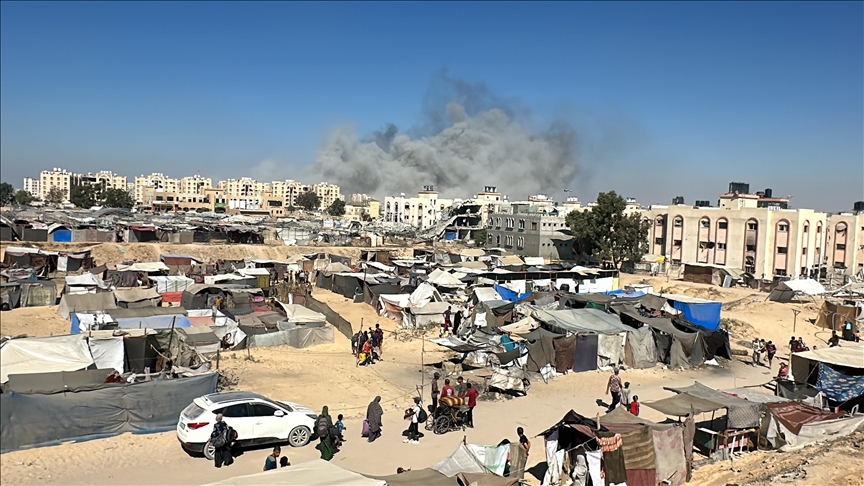Azerbaijan marks 34th anniversary of restoration of its independence
By
BAKU, Azerbaijan/ISTANBUL (AA) – Azerbaijan is marking the 34th anniversary of its restoration of independence.
The country’s independence was declared on May 28, 1918, by the National Council, chaired by Mehmet Emin Rasulzade.
Following a brief two-year period, it was occupied by the Soviet Union, and reclaimed its place as an independent state on Oct. 18, 1991.
Over the past 34 years, Azerbaijan has advanced its economy and strengthened its army.
It has elevated its relations with Türkiye to the level of strategic cooperation and has become a regional actor through its energy and transportation projects.
In the early years of its independence, Azerbaijan faced territorial claims and attacks from Armenia.
Taking advantage of political conflicts in Azerbaijan, Armenia occupied Azerbaijan’s Karabakh and surrounding provinces in 1991-1993.
As a result of the occupation, about 1 million Azerbaijanis were forced to flee their homeland.
For years, Azerbaijan negotiated with Armenia through the Organization for Security and Cooperation in Europe Minsk Group, co-chaired by Russia, the US, and France, to resolve the issue peacefully.
When negotiations failed and the Armenian army escalated its attacks on civilian settlements, Azerbaijan resorted to exercising its rights under international law.
After Armenian forces opened fire on Azerbaijani civilian settlements, Baku launched a counter-offensive operation on Sept. 27, 2020, and liberated its lands.
The Second Karabakh War, which the Azerbaijanis call the “Homeland War,” lasted 44 days and ended on Nov. 10, 2020, when Armenia signed a declaration acknowledging its defeat.
The Azerbaijani army liberated five cities, four towns, and 286 villages from occupation in 44 days. As a result of the declaration, the Armenian army was forced to leave the provinces of Kalbajar, Lachin, and Aghdam.
In September 2023, the Azerbaijani army launched a counterterrorism operation in the Karabakh region, ending the presence of illegal armed forces on the country’s territory.
So, Azerbaijan fully restored its territorial integrity and established its sovereignty throughout the country.
Following this process, peace talks regained momentum.
At a summit in Washington, DC, the parties initialed a peace agreement, taking a significant step toward lasting peace.
– Azerbaijan’s oil, natural gas projects
The foundation of Azerbaijan’s economic development was laid when late President Heydar Aliyev signed the “Contract of the Century” with 11 companies from seven countries, which envisioned the exploitation of the Azeri-Chirag-Guneshli oil field, Azerbaijan’s largest, and the export of oil to global markets.
Azerbaijan collaborated with Türkiye and Georgia to transport the oil, and the Baku-Tbilisi-Ceyhan Pipeline was built.
Azerbaijan now sells oil and petroleum products to over 30 countries.
During the current President Ilham Aliyev’s presidency, a breakthrough was made in the natural gas sector.
The Southern Gas Corridor, consisting of the South Caucasus Pipeline, the Trans-Anatolian Natural Gas Pipeline (TANAP), and the Trans-Adriatic Pipeline (TAP), was constructed, transporting natural gas extracted from the Shah Deniz 2 field to Türkiye and Europe.
Azerbaijani natural gas is exported to 14 countries today.
– ‘1 nation, 2 states’ alliance established with Türkiye
Türkiye has become the first country to recognize Azerbaijan’s independence.
The words “one nation, two states,” used by Heydar Aliyev for Ankara and Baku, became a fundamental principle in relations between the two countries.
Based on a strategic alliance, the two countries have undertaken projects such as the Baku-Tbilisi-Ceyhan Oil Pipeline, the TANAP, and the Baku-Tbilisi-Kars Railway Line.
During the Second Karabakh War, Türkiye and the Turkish people provided political and moral support to Azerbaijan.
Erdogan and Aliyev raised relations between the two countries to a higher level by signing the Shusha Declaration on June 15, 2021.
– Baku takes active role in international organizations
Since its independence, Azerbaijan has established good relations with nearly all neighboring and nearby countries.
It plays an active role in international organizations such as the Organization of Turkic States, the Commonwealth of Independent States, the Organization of Islamic Cooperation, the Non-Aligned Movement, the Economic Cooperation Organization, and the OSCE.
Azerbaijan was a non-permanent member of the UN Security Council in 2012-2013 and held the rotating chairmanship of the Non-Aligned Movement from 2019-2023.
Azerbaijan also hosted the 29th Conference of the Parties (COP 29) to the UN Framework Convention on Climate Change on Nov. 11-22, 2024.
Anadolu Agency website contains only a portion of the news stories offered to subscribers in the AA News Broadcasting System (HAS), and in summarized form. Please contact us for subscription options.


